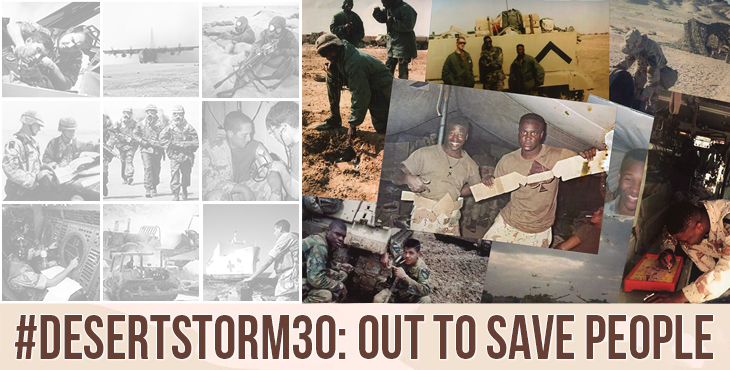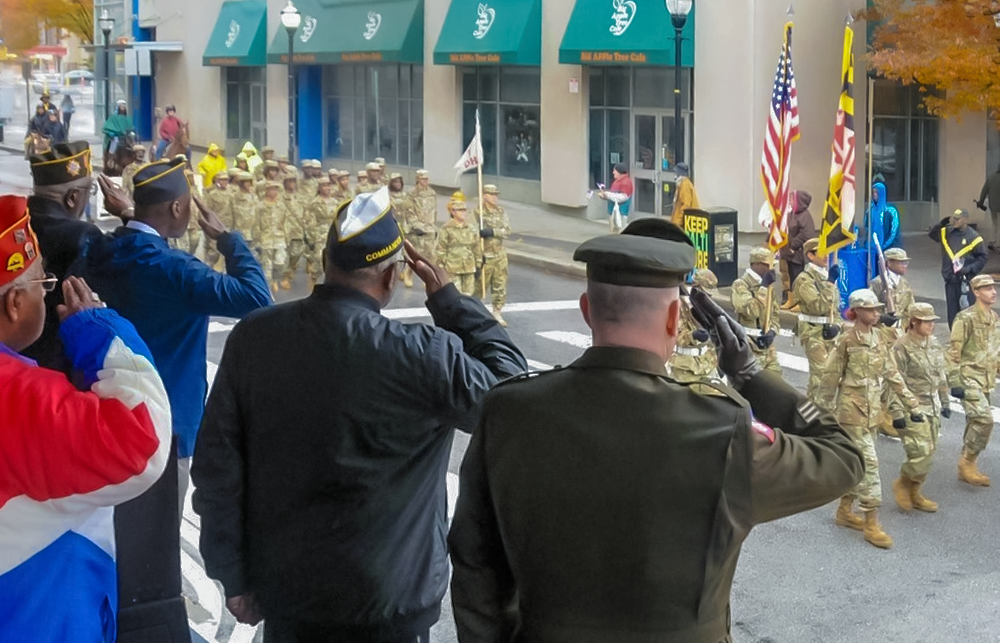Army Veteran Harry Low has always been on a mission to save other people. His mission started in 1988, when he followed two older brothers into the service. He became a combat medic in an engineering unit, stationed at Fort Hood, Texas.
“As a medic, I stayed out in the field a lot, going out with the field units, two, three weeks at a time out in the field,” Low said. It was during one of these field exercises his unit received word there was an upcoming deployment to the Middle East.
“We’re talking the days before social media and the internet, so you don’t get a full story,” Low said. “It’s kind of word of mouth. I remember them pulling us in back early from the field and coming back into garrison and having a formation.”
Low soon learned the news: Saddam Hussein had entered Kuwait by force. His unit was now on alert to deploy. By August 1990, Low was on a plane, headed to the Middle East and landing in Dhahran, Saudi Arabia.
“I’d never felt heat like that in my life,” he said. “Then we loaded up vehicles and we just drove. We drove down this highway and I remember just turning off the highway into the desert. We rode for just like it seemed hundreds of miles into the middle of nowhere and we just stopped.”
The war begins
Once Desert Shield turned into Desert Storm Jan. 17, Low was on the ground, prepared to save other people.
“You could just look outside your vehicle and just see the sky lighting up with the bombs dropping and the anti-aircraft, missiles shooting from the ground, going up and you not knowing who’s firing at who or who’s bombing who.”
Years later, Low still recalls the night’s events.
“You could feel the ground shaking, just what seemed all night,” he said.
Low and his teammates rounded up hundreds of Iraqi prisoners of war. He said they would walk up with flyers dropped from overhead aircraft, then turn themselves in.
“I have no idea to this day what they said,” he added.
As a medic, Low would check out the enemy prisoners of war. He made sure they were healthy enough for allied forces to pick them up. He also tended to Americans, mostly administering IV’s and addressing “a few scorpion bites.”
A new mission
By 1992, Low’s mission to care for the military ended when he left the Army. He picked up a new mission – caring for Veterans as a VA employee.
“When I started here, working with Veterans and taking care of Veterans, I knew this is where I wanted to be,” he said. “I wanted to be at VA.”
Low’s new mission caring for Veterans is as a social worker.
“We help them work past the barriers that kind of led to their homelessness, which may be mental health issues, addiction issues,” he said. “We help them get housed and teach them the skills so they can live independently.”
Vince Bryant, himself a Marine Corps and Navy Veteran, works with Low in the Healthcare for Homeless Veterans Program. Bryant, a support specialist, said the team is like the special forces of helping the homeless, traveling to wherever the Veteran may be, including under bridges or in drug houses. He said their work is focused on saving Veterans.
“When a person leaves the military, it’s kind of hard to readjust to the civilian sector,” Bryant said. “We’ve found ways of using the same skills in the military to help in the community. He was a medic. [Now] His job is to get Veterans out of the street and get them off drugs and alcohol.”
Low said his new mission is what drives him every day.
“I love what I do,” he said. “I love working with Veterans.”
Transforming Veterans
Bryant said he’s personally seen Low transform a Veteran who was at an extremely low point, unable to hold a job and not taking his prescribed medication. Bryant said within six months, Low helped the Veteran turn around his life. The Veteran now has a job and a house – showing Low is still on his mission to save people.
“He took what he did in the military and revamped it for the civilian sector,” Bryant said.
For Low, saving people is what defines him.
“I guess it was just something that was instilled in me, like I’m still in my combat medic mode,” Low said. “And, every day just showing up, like on the battlefield, out to help save someone. I just feel like this is what I was born to do.”
Video by Canaan Brumley, Central Texas Veterans Health Care System
Topics in this story
More Stories
VA and the Veterans Day National Committee (VDNC) invites cities, towns, and non-profit groups across the country to join us in showing appreciation for Veterans by applying to hold VA-recognized regional Veterans Day observances.
VA and the Veterans Day National Committee are now accepting entries for the 2025 Veterans Day Poster Contest. Submissions are due by 11:59 p.m. (EDT) on May 2, 2025.
Secretary Doug Collins announces VA’s shift to in-person work, ensuring a smooth transition while prioritizing service to Veterans.






I was told i will b able to get VA benefits after 65. I was in the military for a short time and have an honorable discharge. That that i am 65 they the VA says i am not eligible for the benefits. I think the military should give persons whom have been eligible for VA benefits with an honorable discharge from the military.
I’m proud to have served my Country, and to read these stories about how the need is great and these People are touching lives just brings a smile to my heart.
Desert Shield to Desert Storm transition was where I fit into the relationship of the military ending. Working in a Hospital then go to a Field Hospital unit for my last 6 months in the Army wasn’t very pleasant, but I push through because the skills still apply and the Need would be Greater in the Field Hospital Unit, so I took it as an HONOR TO BE TRAINED TO ASSIST AND SERVE, TO BE RESPONSIBLE FOR OTHER MEMBERS IN THE ARMY AND OTHER SERVICES!
1984 went for training in California in the Desert to prepare for Desert Storm, as a Patient Administration Specialist, I was Cross Trained in several areas such as Medical Records, Admissions/Discharge/Transfer, Medical Evacuation, Death Certification Billing/Payments and Accounts Receivable.
In our Training Exercise we were packing up to go then an Alarm went off We lined up and found out that Members of the 82nd Airborne were on a Jumping Exercise even though the winds were High, Unfortunately, we had to Seriously, create a Mash Unit Field Hospital then notify local Hospitals we may need their services, as we did.
I had more experience due to my training in Berlin working with Nato Troops. I then understood why God, placed me here in this Unit to work beside great men and women in the Army. My many jobs were to identify the people get them registered and tag them with wrist bands. Then place charts in Triage order, if Soldier was Deceased identify him to the best of my ability NO SOLDIER ON MY WATCH WAS A JOHN DOE, the dog tags are thrown off due to the ejection or when the injury occurred. I sometimes had to assist in taking bodies to the Morgue, again ensuring all proper paperwork is completed that Someone can follow-up with notification of the death. To this day, I still have memories of not sleeping for three days and not being tired. Images I saw no one should ever see, that’s why I tell the Gang bangers if you want to kill for reasons join the Army and request over in the war zones.